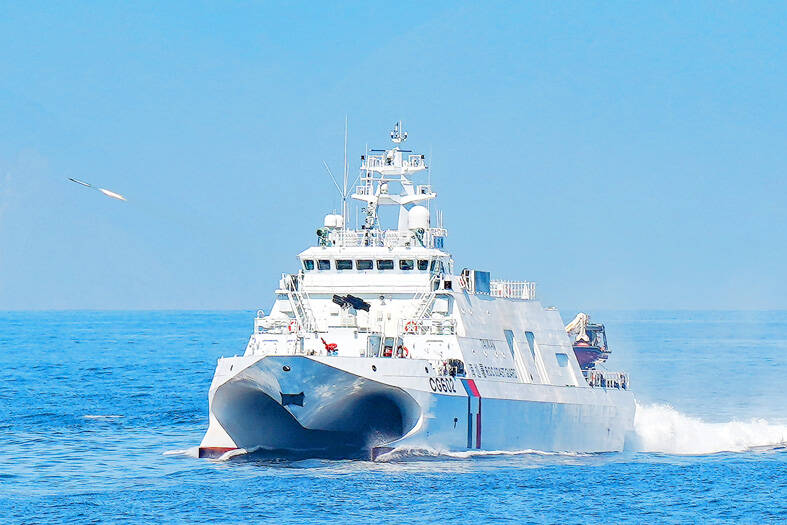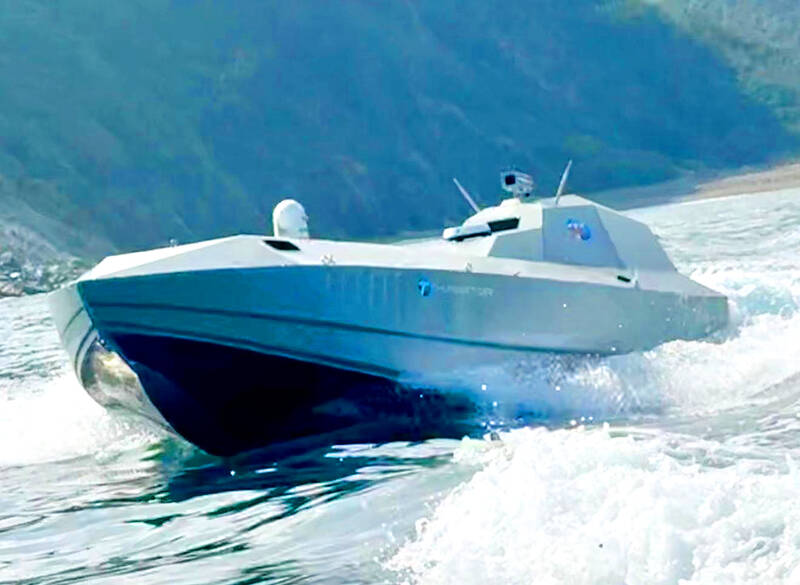The Coast Guard Administration (CGA) is to conduct two live-fire drills next month in waters off Hualien County, amid mounting pressure from Chinese navy and coast guard vessels operating near Taiwan proper.
The naval exercise notice came just days after reports that the Chinese People’s Liberation Army Navy has been directly coordinating China Coast Guard operations to identify potential targets in Taiwan.
The CGA’s eastern branch patrol vessels — Taitung and Cheng Kung — are scheduled to conduct gunnery exercises from 11am to 2pm on May 9 and May 27, the notice said.

Photo: Aaron Tu, Taipei Times
During the drills, the ships would fire 2.75-inch rockets, 20mm and 40mm guns, and small arms, with projectiles reaching a maximum altitude of 452m within the designated restricted zone, it said.
The restricted zone spans the strategically important shipping lane that links the Port of Hualien to the wider western Pacific Ocean, it added.
The Miaoli-class offshore patrol vessel Taitung displaces 1,899 tonnes, and was commissioned in 2016.

Photo courresy of Thunder Tiger Group
The Taitung is armed with a Bofors 40mm gun, a T-75 20mm cannon, two T-75 light machine guns and has a top speed of 25 knots (46.3kph) with a cruising range of 6,000 nautical miles (11,112km).
The Anping-class offshore patrol vessel Cheng Kung displaces 750 tonnes and was commissioned in 1990.
The Cheng Kung is equipped with a 2.75-inch rocket system and a point-defense weapon, and could be retrofitted with two quadruple Hsiung Feng II anti-ship missile launchers, two quadruple Hsiung Feng III anti-ship missile launchers and a Phalanx point-defense system. A catamaran-hulled vessel, it can reach a top speed of 44.5 knots and has a cruising range of 3,250 nautical miles.
In related news, Taiwan-based drone manufacturer Thunder Tiger Group (雷虎科技股) has submitted its SeaShark 800 design for consideration in the Chungshan Institute of Science and Technology’s tender for an uncrewed kamikaze drone boat.
Thunder Tiger is one of six companies to have submitted a design for the contract.
The SeaShark 800 uncrewed surface vehicle is a remote-controlled system with a top speed of 50 knots, a range of 524 nautical miles and a low profile, exceeding the institute’s requirements, the company said.
The vessel is undergoing trials, it added.
Designed with an emphasis on a low radar cross-section, the SeaShark 800 is equipped with a dual radio frequency and GPS navigation system designed to resist electronic interference, the company said.
The boat can be remotely guided at distances of up to 700km from the operator, depending on the strength of electronic interference, the company said.
It also features swarm control capabilities, allowing it to operate either as part of a concentrated group or as a dispersed force, providing enhanced tactical flexibility, it said.
The vessel is 8.1m long and 1.9m tall, displaces 2.7 tonnes and has a shallow draft of less than 0.5m, it added.
It is also to be equipped with an artificial intelligence-enhanced target identification system designed to improve the operator’s ability to distinguish between ship types, flotsam and specialized targets, it said.

The US government has signed defense cooperation agreements with Japan and the Philippines to boost the deterrence capabilities of countries in the first island chain, a report by the National Security Bureau (NSB) showed. The main countries on the first island chain include the two nations and Taiwan. The bureau is to present the report at a meeting of the legislature’s Foreign Affairs and National Defense Committee tomorrow. The US military has deployed Typhon missile systems to Japan’s Yamaguchi Prefecture and Zambales province in the Philippines during their joint military exercises. It has also installed NMESIS anti-ship systems in Japan’s Okinawa

‘WIN-WIN’: The Philippines, and central and eastern European countries are important potential drone cooperation partners, Minister of Foreign Affairs Lin Chia-lung said Minister of Foreign Affairs Lin Chia-lung (林佳龍) in an interview published yesterday confirmed that there are joint ventures between Taiwan and Poland in the drone industry. Lin made the remark in an exclusive interview with the Chinese-language Liberty Times (the Taipei Times’ sister paper). The government-backed Taiwan Excellence Drone International Business Opportunities Alliance and the Polish Chamber of Unmanned Systems on Wednesday last week signed a memorandum of understanding in Poland to develop a “non-China” supply chain for drones and work together on key technologies. Asked if Taiwan prioritized Poland among central and eastern European countries in drone collaboration, Lin

The Chien Feng IV (勁蜂, Mighty Hornet) loitering munition is on track to enter flight tests next month in connection with potential adoption by Taiwanese and US armed forces, a government source said yesterday. The kamikaze drone, which boasts a range of 1,000km, debuted at the Taipei Aerospace and Defense Technology Exhibition in September, the official said on condition of anonymity. The Chungshan Institute of Science and Technology and US-based Kratos Defense jointly developed the platform by leveraging the engine and airframe of the latter’s MQM-178 Firejet target drone, they said. The uncrewed aerial vehicle is designed to utilize an artificial intelligence computer

Renewed border fighting between Thailand and Cambodia showed no signs of abating yesterday, leaving hundreds of thousands of displaced people in both countries living in strained conditions as more flooded into temporary shelters. Reporters on the Thai side of the border heard sounds of outgoing, indirect fire yesterday. About 400,000 people have been evacuated from affected areas in Thailand and about 700 schools closed while fighting was ongoing in four border provinces, said Thai Rear Admiral Surasant Kongsiri, a spokesman for the military. Cambodia evacuated more than 127,000 villagers and closed hundreds of schools, the Thai Ministry of Defense said. Thailand’s military announced that